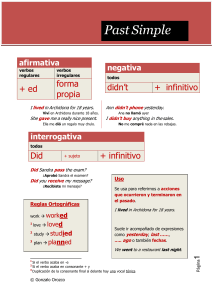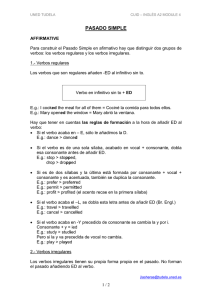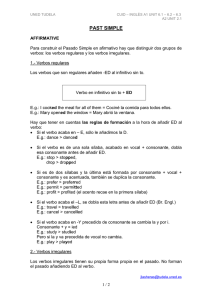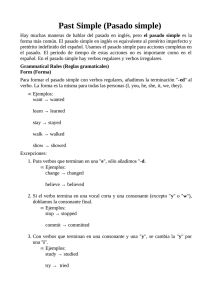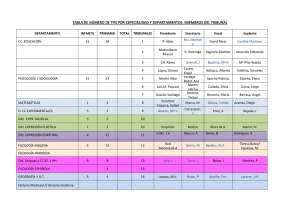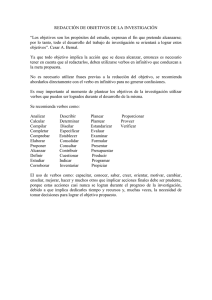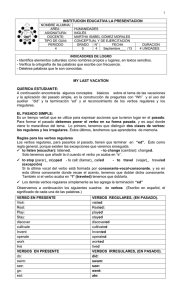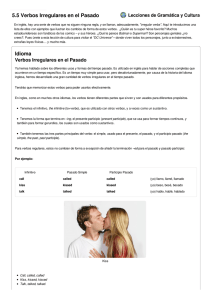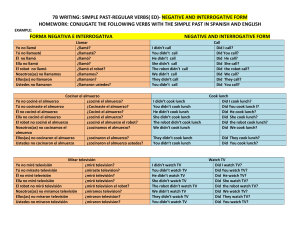Unidad 8: “Artistas y sus trabajos”
Anuncio
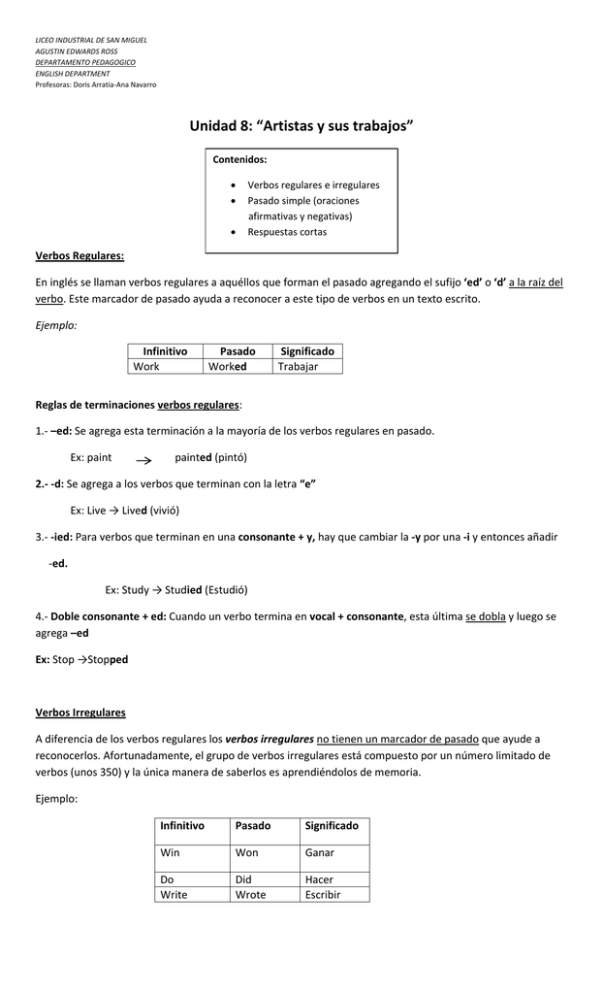
LICEO INDUSTRIAL DE SAN MIGUEL AGUSTIN EDWARDS ROSS DEPARTAMENTO PEDAGOGICO ENGLISH DEPARTMENT Profesoras: Doris Arratia-Ana Navarro Unidad 8: “Artistas y sus trabajos” Contenidos: Verbos regulares e irregulares Pasado simple (oraciones afirmativas y negativas) Respuestas cortas Verbos Regulares: En inglés se llaman verbos regulares a aquéllos que forman el pasado agregando el sufijo ‘ed’ o ‘d’ a la raíz del verbo. Este marcador de pasado ayuda a reconocer a este tipo de verbos en un texto escrito. Ejemplo: Infinitivo Work Pasado Worked Significado Trabajar Reglas de terminaciones verbos regulares: 1.- –ed: Se agrega esta terminación a la mayoría de los verbos regulares en pasado. Ex: paint painted (pintó) 2.- -d: Se agrega a los verbos que terminan con la letra “e” Ex: Live → Lived (vivió) 3.- -ied: Para verbos que terminan en una consonante + y, hay que cambiar la -y por una -i y entonces añadir -ed. Ex: Study → Studied (Estudió) 4.- Doble consonante + ed: Cuando un verbo termina en vocal + consonante, esta última se dobla y luego se agrega –ed Ex: Stop →Stopped Verbos Irregulares A diferencia de los verbos regulares los verbos irregulares no tienen un marcador de pasado que ayude a reconocerlos. Afortunadamente, el grupo de verbos irregulares está compuesto por un número limitado de verbos (unos 350) y la única manera de saberlos es aprendiéndolos de memoria. Ejemplo: Infinitivo Pasado Significado Win Won Ganar Do Write Did Wrote Hacer Escribir Affirmative Sentence: Las oraciones afirmativas nos sirven para afirmar hechos que ocurrieron en un momento determinado en el pasado. Su fórmula gramatical es: Sujeto + Verbo en pasado + Complemento Ex: Christopher Columbus discovered America in 1492. VerboTo Be: En pasado simple el verbo “to be” tiene 2 formas was y were las cuales se usan con diferentes pronombres. I He you was were We they She It Obs: En la forma negativa se usa con los mismos pronombres y sólo debes agregar un “not” al lado. Ej. Was not/ were not. (Wasn’t/Weren’t) Negative Sentence: Las oraciones negativas niegan hechos que ocurrieron en el pasado. Su fórmula es Sujeto + didn’t + Verbo infinitivo + Complemento Obs: El auxiliar didn’t es usado con todos los pronombres. Ex: Leonardo da Vinci didn’t live in Chile Activity 1: Change these sentences into negative form 1. Teresa of Calcutta helped poor people Ex: Teresa of Calcutta didn’t help poor people 2. 3. 4. 5. The French Revolution was in 1789. Copernicus discovered the solar system. Henry VIII of England got married six times. Alexander Bell invented the telephone Activity 2 Read the story and complete with the verbs in the Past Simple Maria Sklodowska-Curie(1) _______ (be) a physicist and chemist. She (2) ________ (begin) her studies in Poland but in 1891 she (3) ________ (leave) for France. She (4) _______ (study) there and later (5) _________ (work) as a scientist at the Sorbonne in Paris. She (6) __________ (meet) and (7) __________ (marry) a French scientist, Pierre Curie. They (8) __________ (have) two children, Irene and Ewa. Maria and Pierre (9) _________ (discover) two radioactive elements, radium and polonium. Pierre (10) __________ (die) in 1906 in an accident in Paris. Maria (11)__________ (get) two Nobel Prizes, in 1903 and in 1911. She (12)__________ (die) in 1934. Interrogative Sentences: Las oraciones interrogativas se estructuran de la siguiente manera: Did + Sujeto + Verbo infinitivo + Complemento? Obs: El auxiliar Did es usado con todos los pronombres. Ex: Did John Lennon die in 1981? Short Answers Las respuestas cortas se usan para aceptar o negar informaciones de las preguntas Did Pablo Neruda win the Nobel? (√)Yes, he did Did Shakespeare write “La Casa de los Espíritus”? (x)No, he didn’t Activity3: Look for information in the internet and answer these questions. 1. 2. 3. 4. 5. Did Gustave Eiffel design the Eiffel tower? Did Isabel Allende write “El Principito”? Did Leonardo Da Vinci paint “The Mona Lisa” Did Samuel Morse create the telephone? Did Alexander Fleming invent the Penicillin? Activity 1 answers: 2. The French revolution wasn’t in 1789 3. Copernicus didn’t discover the solar system Activity 2 answers: 1.was 2.began Activity 3 answers: 1. Yes, he did 2. No, she didn’t 3. left 4. studied ____________________________ ____________________________ ____________________________ ____________________________ ____________________________ 4.Henry VIII of England didn’t get married six times 5. Alexander Bell didn’t invent the telephone 5. worked 6. met 7. married 8. had 9. discovered 3. Yes, he did 4. No, he didn’t 5. Yes, he did 10. died 11. got 12. died
